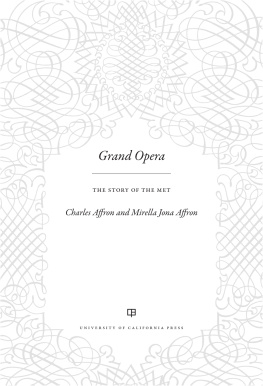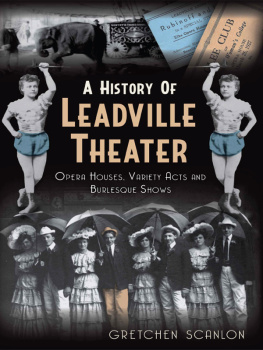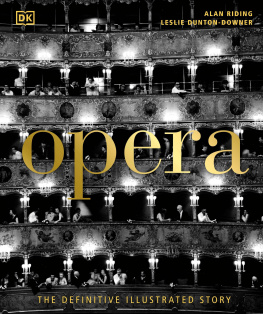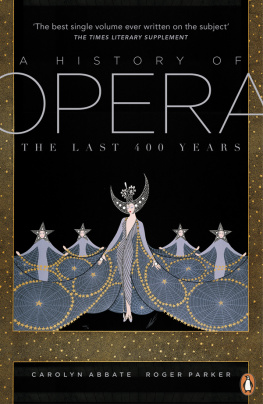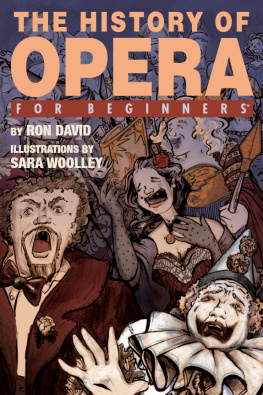PREFACE
Three decades have passed since Martin Mayer recalled the response of Oscar Hammerstein I to a casual, Hows business? Operas no business, Hammerstein shot back. Its a disease. His quip resonated with Mayer, as it does with us and, we suspect, with many of our readers. Mayers The Met (1983) is the most recent comprehensive history of the company prior to this volume. And like Grand Opera: The Story of the Met, it is both an institutional and performance history of the premier opera company in the United States, one of the worlds most prestigious and influential cultural organizations. Thirty years and a changed universe later, an updated reconsideration is due.
Each of our eleven chronologically sequenced chapters focuses on an area of the repertoire: a national canon (French opera, for example, as in chapter 2) or a composer, (for example, Giacomo Puccini, the central figure of chapter 4). The history of the company is in large part the history of the fortunes of bel canto and verismo, of Verdi and Wagner, and eventually of Adams and Glass. We trace the evolving profile of the repertoire as it responds to the push of reinvention and the pull of tradition, as it conforms to the talents of the stars, the interests of the board and of the management, the will of conductors, the taste of the critics, the predilections of the public. Through 194950, we are concerned primarily with premieres; to that point, new productions of revivals were generally staged as they had always been, simple refittings with fresh scenery and costumes. Beginning in 1950 with the advent of Rudolf Bing, and the attention he gave to direction and design, we take note of many revivals as well.
And each chapter engages numerous remarkable performances in the context of the issues that informed the times. The inaugural 1883 Faust affirmed the compatibility of an aristocratic European entertainment with the temper of the still young New World republic. In 1907, the Mets first performance of Salome erupted into a scandal that pitted the board of directors against the management; Richard Strausss opera spent the next twenty-seven years in exile from the Met. The 1910 world premiere of Puccinis La Fanciulla del West was a vehicle for Enrico Caruso whose fame in live performance ballooned through the diffusion of opera via the phonograph at the dawn of sound reproduction. The very survival of the Metropolitan during the Great Depression depended in large measure on the Tristan and Isolde of Lauritz Melchior and Kirsten Flagstad, the two mighty pillars of a brilliant Wagnerian epoch. Bruno Walters Met conducting debut in Fidelio, less than a year before the US entry into World War II, speaks to the myriad positive and negative consequences of international conflict on an international company. In 1966, the choice of Leontyne Price to head the cast of Samuel Barbers Antony and Cleopatra as it opened the new house at Lincoln Center joined the politics of labor and race relations to the politics of opera as an American idiom. With John Dexters mise-en-scne for Francis Poulencs Dialogues des Carmlites in 1977, the Met sought to address its straitened budget while embracing cutting-edge stage practice. The 2002 company premiere of Sergei Prokofievs War and Peace kept the promise that perestroika would bring a notable expansion of the Slavic wing of the repertoire together with an influx of East European artists. The clamorous success of Peter Gelbs ongoing initiative that between 200607 and 201213 beamed Robert Lepages contested Ring and more than sixty other Metropolitan productions onto screens that now number nearly two thousand drew millions of global spectators into animated debates over opera and its performance, staging in particular. However different the issues that pertained to the first Faust from those that surrounded the Barber premiere or the Wagner tetralogy, these extraordinary occasions, and so many others memorable and not, and invariably their reception, are products of multiple factors: the status of the work in the repertoire, the musical and dramatic values of the performance, the weight of institutional pressures, the broader political, social, and economic context. They call for the layered approach that underpins this history.
A word about our sources. The Metropolitan Opera Archives house a rich lode of primary documents that shed light on the 290 different operas that the company has presented in nearly twenty-eight thousand performances between 1883 and spring 2013. The decisions that shape seasons and careers emerge in the day-to-day memoranda and correspondence of the board and its committees, of the general managers and their assistants, of artists and agents, in minutes of meetings, in contracts and paybooks, in box-office records, in audition notes. We have made extensive use of the archives through the 200506 season, Joseph Volpes last, and the last for which documents have been accessible to us. All primary sources we cite without attribution are holdings of the Met Archives.
Along with Mayers The Met, we draw upon Henry Krehbiels two-volume chronicle, Chapters of Opera (1908) and More Chapters of Opera (1919), erudite and eloquent firsthand recitals of Met premieres and of the singers of the Golden Age. Irving Kolodins The Metropolitan Opera, 18831966 (1966) is the last of the authors several editions (1936, 1940, 1953). Kolodin takes into account shifts in the relationship of the company to its patrons and organizational restructurings. He also makes note of every premiere, revival, new production, debut, and cast change. We have chosen instead to provide tables that constitute an inventory of all the operas produced by the company. These tables record the name of the composer, the date of the company premiere, the date of the most recent performance as of this writing, the number of seasons in the repertoire, the number of productions and performances, the date and place of the world premiere, and the names of the director and designer. Titles that made negligible impressions may be referenced only in these tables. Two other histories timed to coincide with the close of the Old Met, Quaintance Eatons The Miracle of the Met (1968) and John Briggss Requiem for a Yellow Brick Brewery (1969), are less systematic, more anecdotal than Kolodins. John Dizikess Opera in America (1993) locates the Met within the orbit defined in its title. Johanna Fiedlers Molto Agitato (2001) is a spirited survey centered on the 1980s and 1990s, when the author was the companys general press representative. Saturday Afternoons at the Old Met (1992), Sign-Off for the Old Met (1997), and Start-Up at the New Met (2006), Paul Jacksons three-volume history and analysis of Metropolitan broadcasts, have been a valued companion to our own listening.

